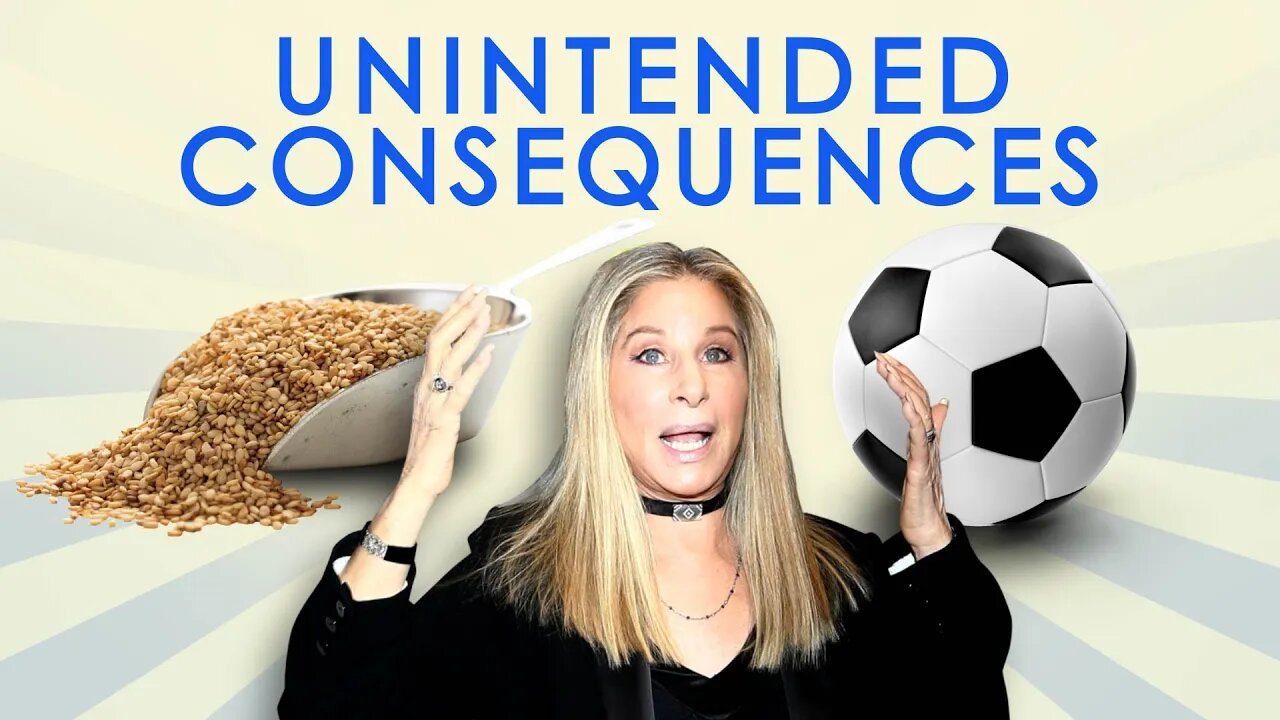Premium Only Content

Great Moments in Unintended Consequences (Vol. 10)
Good intentions, bad results.
Watch the whole series here: https://www.youtube.com/watch?v=5hwuRkJMo_4&list=PLBuns9Evn1w9XhnH7vVh_7C65wJbaBECK
https://reason.com/video/2023/01/13/great-moments-in-unintended-consequences-vol-10/
______
Part One: See Shores
The year: 2003
The problem: There's a photo of Barbra Streisand's house on the internet!
The solution: Sue the photographer for $50 million, and demand the photo be removed.
Sounds like a great idea, with the best of intentions. What could possibly go wrong?
It turns out that when you try and hide something, people get interested. The aerial image—part of a larger project to document coastal erosion—had only been downloaded six times before Streisand got upset. But in the month following the lawsuit, over 400,000 people clicked on the image of Streisand's house. Babs lost her case and was forced to pay $177,000 in legal fees, and the Streisand Effect is now shorthand for bringing unwanted attention to the very thing being suppressed.
Maybe next time, don't mansion it!
Part Two: Open Sesame
The year: 2022
The problem: Over a million Americans are allergic to sesame seeds!
The solution: Add them to the Food and Drug Administration (FDA)'s major allergens list, which requires food manufacturers and restaurants to disclose if products either contain or might have come into contact with the seeds.
Sounds like a great idea, with the best of intentions. What could possibly go wrong?
Turns out sesame seeds are small and a bit hard to keep track of, making it frustrating and expensive to guarantee seeds will not cross-contaminate other foods. Under the stringent FDA rules, it's not good enough to simply state that a food "may contain" or is "produced in a facility" that uses sesame, so rather than go through the cost and hassle of assuring there are none in their product, companies simply added small amounts of sesame to their products and included it in the lists of ingredients.
Presto! Problem solved! Unless, you know, you're allergic.
Part Three: Golden Goals
The year: 1994
The problem: Ties in soccer are boring!
The solution: Organizers of the Caribbean Cup made game-winning overtime goals count double, pushing teams to play aggressively in extra time!
Sounds like a great idea, with the best of intentions. What could possibly go wrong?
Turns out… math!
In the last group game of the tournament, Barbados needed to beat Grenada by two goals to reach the final. Otherwise, Grenada would advance.
With only minutes left in the match, Barbados found themselves up by only a single goal. Realizing their predicament, Barbados scored on themselves. So long as they could keep the game tied during regular play, Barbados could win by two with a single score in overtime.
What followed was one of the most bizarre five minutes in the history of the game, with Barbados defending both goals while Grenada tried to score on either end of the field.
Grenada failed, Barbados scored in overtime, and the rule was dropped. And then it rolled around on the pitch for a while, grabbing its knee, looking for a penalty.
Goooooooo reevaluate your priors.
Great moments in unintended consequences: good intentions, bad results.
Written and produced by Meredith and Austin Bragg; narrated by Austin Bragg
-
 1:34:06
1:34:06
ReasonTV
19 days agoRichard Dawkins: Why atheism is winning
614 -
 1:43:07
1:43:07
Tucker Carlson
1 day agoBishop Barron on the New Pope, the Foolishness of Atheism, and Why Young Men Are Turning to Christ
190K199 -
 3:24:07
3:24:07
Barry Cunningham
5 hours agoJD Vance And Marco Rubio Speak at American Compass Fifth Anniversary Gala | And More News!
50.1K23 -
 2:52:45
2:52:45
TimcastIRL
4 hours agoTrump Admin ARRESTS Boulder Terrorists ENTIRE FAMILY, Preps Deportations | Timcast IRL
157K88 -
 2:40:48
2:40:48
RiftTV/Slightly Offensive
6 hours agoBig, Beautiful SCAM? Elon FLIPS on Trump for WASTEFUL Bill | The Rift | Guests: Ed Szall + Matt Skow
42.8K12 -
 LIVE
LIVE
SpartakusLIVE
5 hours agoSpecialist TOWER OF POWER || Duos w/ Rallied
564 watching -
 3:24
3:24
Glenn Greenwald
5 hours agoPREVIEW: Sen. Rand Paul Interview Exclusively on Locals
84.8K51 -

VapinGamers
4 hours ago $0.05 earned⚔ 🔥 Blades of Fire - Game Review and Playthru - !game !rumbot #sponsored
30.6K4 -
 LIVE
LIVE
ZWOGs
8 hours ago🔴LIVE IN 1440p! - Max Payne 3, Halo Infinite, Marvel Rivals, Splitgate 2, & Maybe Helldivers 2 - Come Hang Out!
58 watching -
 1:14:00
1:14:00
The Daily Signal
5 hours ago🚨LIVE: Democrats Champion Illegals Amid MORE ICE Arrests
42.2K1